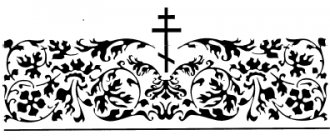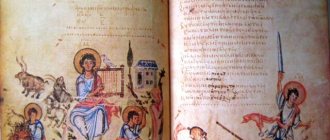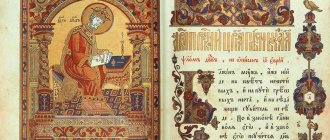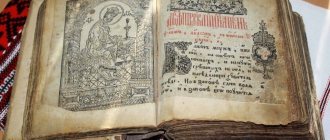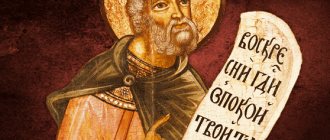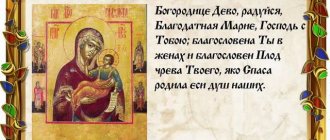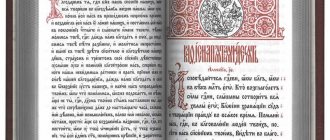Psalter. Kathisma 7
KATHISMA SEVEN.
Psalm 46.
1 Finally, about the sons of Korah, psalm.
2 All nations clasp your hands and shout to God with a voice of joy. 3 For the Lord Most High is awesome, a great King in all the earth. 4 Submit people to us and languages under our feet: 5 choose for us your inheritance, the kindness of Jacob, which you will love. 6 God comes up with a shout, the Lord with a trumpet sound. 7 Sing to our God, sing, sing to our King, sing. 8 For God is the King of all the earth, sing sensibly. 9 God reigns over the nations; God sits on His holy throne. 10 The princes of mankind gathered together with God Abraham. As God's powers of the earth have risen greatly.
Psalm 47.
1 Psalm, songs of the sons of Korah, second Sabbath.
2 Great is the Lord and greatly praised in the city of our God, in the mountain of His holy ones. 3 With noble joy of the whole earth: the mountains of Zion, the ribs of the north, the city of the Great King. 4 We know God in His troubles, when He intervenes. 5 For behold, the kingdom of the earth has gathered together and come together. 6 When Ti saw this, she was surprised, confused, and moved. 7 I receive trembling: there are diseases like those that give birth. 8 With a stormy spirit you will destroy the ships of Tarshia. 9 As we have heard and seen in the city of the Lord of hosts, in the city of our God, God is the foundation and for ever. 10 We accept, O God, Your mercy in the midst of Your people. 11 Because of Your name, O God, Your praise is to the ends of the earth; Your right hand will fulfill righteousness. 12 Let Mount Zion rejoice, and let the daughters of Judah rejoice for your sake, O Lord. 13 Go through Zion and embrace it, lead it among the pillars. 14 Set your hearts on His strength and divide His houses, as the story is told in another generation. 15 For He is our God forever and ever, He will save us forever.
Psalm 48.
1 Finally, son of Korah, psalm.
2 Hear this, all the nations, teach all the inhabitants of the world: 3 And the earthly and the sons of mankind, the rich and the poor together. 4 My mouth shall speak wisdom, and the teaching of my heart shall be understanding. 5 I will incline my ear to a parable, I will open my prayer to the psalms. 6 How often am I afraid, on the day of fierceness? The iniquity of my heel shall pass me by. 7 Those who trust in their own strength and boast about the abundance of their riches, 8 will not a brother deliver, but will a man deliver? He will not give God treason for this, 9 and the price of the deliverance of his soul, and he will labor forever. 10 And he will live to the end, and will not see destruction. 11 When the wise see them die, the foolish and the foolish will perish and leave their wealth to strangers. 12 And destroy their dwellings forever, their villages from generation to generation, calling their names upon the lands. 13 And man, having no understanding of honour, was related to foolish cattle and became like them. 14 This way is their temptation, and they still delight in their mouth. 15 For the sheep are in hell; I will preserve death, and they have the rights of the morning, and their help is promised in hell, from the glory of which it was made. 16 Otherwise God will deliver my soul from the hand of hell when He receives me. 17 Fear not, when a man becomes rich, or when the glory of his house increases: 18 For if he dies, he will not take it all; his glory will come down from him. 19 For his soul will be blessed in his belly: I will confess to You when You do good to him. 20 Even his father will go down to his generation, and will not see the light until he is born. 21 And man, having no understanding of honour, was likened to foolish cattle and became like them.
Glory:
Psalm 49.
Psalm to Asaph.
1 The God of gods, the Lord of words, called the earth from the east of the sun to the west. 2 From Zion comes the beauty of His beauty. 3 God will come, our God, and will not be silent: a fire will burn before Him, and a storm will surround Him. 4 Heaven will call from above and the earth to judge His people. 5 Gather together those who are like Him, who will make His covenant concerning sacrifices. 6 And the heavens will declare His righteousness, for God is the judge. 7 Hear, my people, and I will say to you Israel, and testify to you: God, I am your God. 8 I will not reprove you about your sacrifices, but your burnt offerings will be brought out before me. 9 I will not accept bulls from your house, nor goats from your flocks. 10 For all the beasts of the oak forest, the cattle of the mountains, and the oxen are mine. 11 I know all the birds of the sky, and the beauty of the countryside is with Me. 12 If I hunger, I will not say to you: For the world and its fulfillment are Mine. 13 Do I eat yam meat or drink the blood of goats? 14 Devour a sacrifice of praise to God and render your prayers to the Most High. 15 And call upon Me in the day of your tribulation, and destroy you, and glorify Me. 16 But God said to the sinner: How will you tell my justifications and accept my covenant with your mouth? 17 But you hated this punishment and you turned back my words. 18 If your aunt saw you, you went with him, and you considered your part with the adulterer. 19 Your mouth multiplies malice, and your tongue weaves together flattery. 20 When you sat down, you slandered your brother, and you set a temptation against your mother’s son. 21 Thou hast done these things, and kept silent, thou hast mourned iniquity, that I should be like thee. I will reprove you and bring your sins before you. 22 Understand this, you who forget God, lest he snatch away, and never deliver. 23 The sacrifice of praise will glorify Me, and there is the way, whereby I will show him My salvation.
Psalm 50.
1 Finally, a psalm to David, always go to Nathan the prophet, 2 always go to Bathsheba, Uri’s wife.
3 Have mercy on me, O God, according to Your great mercy, and according to the multitude of Your compassions, cleanse my iniquity. 4 Above all, wash me from my iniquity, and cleanse me from my sin. 5 For I know my iniquity, and I will take away my sin before me. 6 I have sinned against You alone, and I have done evil before You, so that You may be justified in Your words and overcome, and never judge You. 7 Behold, I was conceived in iniquity, and my mother gave birth to me in sins. 8 For thou hast loved the truth, thou hast revealed to me thy unknown and secret wisdom. 9 Sprinkle me with hyssop, and I will be clean; wash me, and I will be whiter than snow. 10 Give joy and gladness to my hearing; humble bones will rejoice. 11 Turn away Your face from my sins, and cleanse all my iniquities. 12 Create in me a pure heart, O God, and renew a right spirit in my womb. 13 Do not turn me away from Your presence, and do not take Your Holy Spirit from me. 14 Give me the joy of Your salvation, and strengthen me with the Lord’s Spirit. 15 I will teach the wicked your way, and wickedness will turn to you. 16 Deliver me from bloodshed, O God, God of my salvation; my tongue will rejoice in Your righteousness. 17 O Lord, my lips are opened, and my mouth declares Your praise. 18 Even if you had desired sacrifices, you would have given burnt offerings without being pleased. 19 The sacrifice to God is a broken spirit, a contrite and humble heart, God will not despise. 20 Bless Zion, O Lord, with Your favor, and may the walls of Jerusalem be built. 21 Then you will be pleased with the sacrifice of righteousness, the wave offering, and the burnt offering: then they will lay the bull on your altar.
Glory:
Psalm 51.
1 At last, in the end of David's mind, 2 the King of Edom should go and tell Saul, and say to him, “David has come to the house of Abimelech.”
3 Why do you boast in greater malice? Lawlessness all day long. 4 Your tongue plots lies, for you have made flattery a cunning razor. 5 Thou hast loved wickedness more than kindness, rather than speak righteousness. 6 Thou hast loved all the words of the flood, and a flattering tongue. 7 For this reason God will destroy you completely, will devastate you, and will remove you from your village and your root from the land of the living. 8 They will see righteousness and fear, and they will laugh at him and say: 9 Behold the man who did not put God as his helper, but trusted in the abundance of his riches, and in his vanity. 10 But like the olive tree that bears fruit in the house of God, I trust in the mercy of God forever and ever. 11 We will confess to You forever that You have created, and I endure Your name, for it is good in the sight of Your saints.
Psalm 52.
1 Finally, about maleph, the understanding of David.
2 The speech is foolish in his heart: there is no God, having been corrupted and detested by iniquity, he does not do good. 3 God came from heaven against the sons of men, see, is there anyone who understands or seeks God? 4 Having all turned aside, they were not needed together, and did not do good, not to one. 5 Lest all those who practice iniquity, who eat my bread for food, understand that they have not called upon the Lord. 6 There they were afraid of fear, even though there was no fear, for God had scattered the bones of men-pleasers: they were ashamed, for God had despised them. 7 Who will give salvation to Israel from Zion? Whenever God brings back the captivity of His people, Jacob will rejoice and Israel will rejoice.
Psalm 53.
1 Finally, in the songs of David's understanding, 2 Zipheem came and said to Saul, “Has David hidden himself in us?”
3 O God, in Your name save me, and in Your power judge me. 4 O God, hear my prayer, inspire the words of my mouth. 5 For strangers rose up against me and sought my life with strength, and did not set God before them. 6 Behold, God helps me, and the Lord is the Protector of my soul. 7 He will turn away the evil of my enemies; consume them with Your truth. 8 I will devour You; I will confess to Your name, O Lord, 9 that it is good, that You have delivered me from all sorrow, and that my eye has looked upon my enemies.
Psalm 54.
1 Finally, in the songs of the mind of Asaph, a psalm.
2 Inspire my prayer, O God, and do not despise my supplication. 3 Hear me and hear me: I was grieved by my sorrow and was troubled. 4 From the voice of the enemy and from the oppression of the sinner, who turned away iniquity against me and was angry with me. 5 My heart is troubled within me, and the fear of death attacks me. 6 Fear and trembling came upon me, and darkness covered me. 7 And he said, “Who will give me a krill like a dove?” And I’ll fly and rest? 8 Behold, he went away in flight and settled in the wilderness. 9 I trust God, who saves me from cowardice and from the storm. 10 Flood, O Lord, and divide their tongues: for I have seen lawlessness and strife in the city. 11 Day and night he will walk along its walls. Lawlessness and labor are in the midst of it and untruth. 12 And his hundred profit and flattery did not fail. 13 For if the enemy had reviled me, I would have suffered slaughter, and if the one who hated me had spoken against me, I would have hid from him. 14 But you, the indifferent man, my master and my acquaintance, 15 who greatly enjoyed being with me, walking in the house of God with one mind. 16 Let death come upon her, and let them go down to hell, for wickedness is in their dwellings, in the midst of them. 17 I cried to God, and the Lord heard me. 18 Evening and morning and noon I will tell, and I will proclaim, and he will hear my voice. 19 He will deliver my soul with peace from those who come near me, for many have fought with me. 20 God will hear and humble me, who was before the world. For they will not change, as if they did not fear God. 21 You have stretched out your hand for retribution, profaning His covenant. 22 His face was divided from the wrath, and their hearts drew near, and their words were quenched more than oil, and they are arrows. 23 Cast your sorrow upon the Lord, and He will feed you, and will not give the reputation of the righteous forever. 24 But you, O God, have brought them down into a state of decay; men of blood and deceit will not spend half their days. But, Lord, I trust in You.
Glory:
According to the 7th kathisma, the Trisagion of Our Father: Also troparia, tone 5:
The judge sits, and the angel stands, the trumpet blows, the flame burns, what have you done, my soul, led to judgment? Then your evil will be revealed, and your secret sins will be exposed. Moreover, before the end, the Judge cries: God, cleanse me and save me.
Glory: We will conquer all, and Christ will be buried with much oil and bright lights, so that we will be made worthy of the palace inside, even if he who has comprehended outside the doors, idly will cry out to God: have mercy on me.
And now: Lying on the bed of many sins, I am robbed of the hope of my salvation, for the sleep of my laziness intercedes for torment for my soul. But You, God, were born of a Virgin, raise me up to Your singing, that I may glorify You.
Lord, have mercy (40) and prayer:
Lord, my God, who is Good and Lover of Mankind, you have done many kindnesses to me, even more than you expected to see, and what will I repay your goodness, my Lord, Lord? I thank Your much-sung name, I thank Your inscrutable kindness towards me, I thank Your unconditional long-suffering. And from now on, intercede, and help me, and cover me, Master, from everyone, even if no one can sin before You: You weigh my useful nature, You weigh my madness, You weigh what I have done. , even in knowledge and not in knowledge, even voluntary and involuntary, even in the night and in the days, and in the mind, and thoughts, for God is Good and Lover of Mankind, cleanse me with the dew of Thy mercy, Most Good Lord, and save us in Thy holy name , like fate. For You are the Light and the Truth and the Life, and to You we send glory, to the Father and the Son and the Holy Spirit, now and ever and unto ages of ages, amen.
Orthodox commemoration of the departed
In Orthodoxy, it is customary to remember deceased relatives on the anniversary of their death and on major church holidays. Prayers for the deceased are read on the designated days and in compliance with the established rules.
The fact that the afterlife exists and the soul of the newly deceased reaches its destination on its own within 40 days and undergoes various tests was learned thanks to Blessed Theodora. After death, the saint went to Paradise and had the opportunity to inform those living on Earth about how long it takes the soul after death to get to its destination. In addition to Theodora, the benefits of reading the psalm were demonstrated by the apostles, who prayed for the soul of the Mother of God for 3 days and sang prayers from the Psalter near her tomb.
Every person who has lost a loved one needs to read prayers for the repose. It is believed that in this way thoughts of loss recede into the background, and the person praying calms down and prepares for further life without the deceased. Prayer is a special language in which a person speaks with God and with those who are in Heaven.
The need to recite songs of praise for the departed for up to 40 days is considered to be a help to the wandering soul, and the more words spoken in its honor, the greater the likelihood of the newly deceased entering Paradise. In addition, words from the Psalter, spoken from the heart, help to overcome the difficulties that befall the deceased on the way to their destination.
The Church recommends reading the Psalter for the Dead continuously, starting at the moment of a person’s death and ending on the 40th day after his departure. On special occasions, holy words are read 80 days from the date of death of a person. There is an Orthodox custom to read the entire Psalter 3 days after the departure of a relative to another world, and it is recommended to do this before his burial.
You need to start pronouncing the holy words near the coffin of the deceased while standing, and finish without his physical presence at home or in the temple. If it is not possible to read the holy book directly over the body, then the relatives of the deceased divide the chapters of the Psalter among themselves and at the appointed time, each in turn begins to fulfill the duty assigned to him, observing the continuity of prayer.
The word “Psalter” translated into Russian from ancient Greek means the name of a musical instrument. This church book consists of 150 songs, or songs, which can be read both in church and at home. The psalms are divided in the book into chapters called "kathismas", each of which contains almost an equal number of chants.
When a person dies, his relatives, in addition to verbal assistance to the deceased, must prepare kutya from wheat and honey and consecrate the dish in church at the morning service. After which sweet porridge is fed to those who came to honor the memory of the deceased. In addition, it is recommended to order a magpie in the temple so that the monks pray for the deceased for 40 days.
Order of reading the psalms
The first rule of psalm reading is the continuity of the event. If it is not possible not to break away when commemorating the deceased, then the church sets aside 3, 9 and 40 days, during which the Holy Word must be pronounced.
The introductory text for commemorating the newly deceased is located before the first chapter of the Psalter. Before each of the 20 chapters of the book, you need to say a prayer 3 times, beginning with the words “Come, let us worship...”, and after each “Glory” the prayer “Remember, O Lord our God...” is read, the text of which is placed at the end of “Following the exodus of the soul from body", where the deceased is called by name. When any of the kathismas ends, you need to read the “Our Father” and troparia for the deceased. You don’t have to pronounce the names of the holy songs - this will not be a mistake.
If for some reason the publication does not have an introductory text, then before reading the kathisma you can recite the “Prayers of the Holy Fathers” from memory. At the next stage they read “Glory”, and after that “To the Heavenly King”. Then they act according to the described scheme.
Kathismas are read while sitting; you need to get up while glorifying the Lord. If health permits, the Psalter is studied standing, which will additionally count for both the person praying and the deceased. It is forbidden to recite holy songs while lying on the bed, because such a position is disrespectful towards the Higher powers and the deceased. It is believed that the soul of the deceased remains next to the body for up to 3 days, so it can listen to prayers and psalms.
In addition, the Psalter has long been considered a holy book that does amazing things. Before the New Testament, with the help of psalms, demons were cast out from the possessed and the soul was healed.
